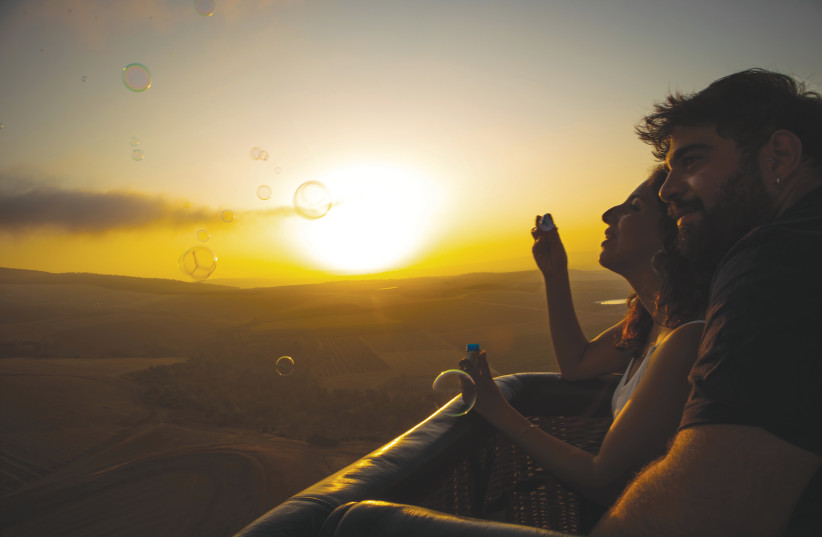The dull haze of the morning simmered over us. The heat still lingered from the days before, despite it being early morning. The sun wouldn’t come up for another couple of hours.
The previous evening, we arrived at the home of our host, Ari, a former Jerusalem Post editor. As we weren’t sure about how we would get to the hot-air balloon site, we called a slew of taxi companies, none of which would take us the short 10-minute drive at 4:30 in the morning. Although Ari very kindly offered to take us, we managed to secure a ride from one of the employees of the hot-air balloon company.
After a sleepless night, I rose to the sound of my co-worker’s voice: “Isaac, time to get up.” We rushed to get ready and catch our ride.
We jumped into the towering blue truck and flung our papers onto the back seat. Arabic music rang from the speakers. The driver’s name was Amir.
“Ani tzalam, ani kotev,” I said, introducing myself, “I’m a photographer, I write.”

Now, the Hebrew word tzalam (photographer) is similar to the Arabic word for peace, salam.
“You want peace?” Amir asked. “Me too. People are people.”
“I mean, I’m a photographer. But I also want peace,” I replied. Although I felt like I shouldn’t have corrected him, I wanted to clarify what I was saying.
Soon, the truck came to a halt as we arrived at an open field, where we were joined by a few couples and a family of three.
A camping rug was laid out on the field, upon which stood a coffee table groaning with snacks, coffee, and candy.
The setup – assembled from the trailer of a truck – felt a bit sophisticated, if not kitschy, considering we were all standing in a field.
I struck up a conversation with a lovely young couple, Maayan and Anis. Both were full of hopes and dreams; Anis in her long green dress with white floral detail, and Maayan in his white shirt and perfectly groomed hair.
It was Maayan’s 21st birthday, and Anis had surprised him with the balloon ride. Their love felt pure and crisp, like they’d known each other their whole lives. When we were ensconced in the hot-air balloon, Anis rested her head on Maayan’s shoulder as we ascended into the clouds.
A moment stuck in time
The air became quiet, and all murmurs of conversation faded to a whisper against the beauty of the sky. Like a painting, the hues spattered across the canvas. Below us, speckles of farm animals grazed among the rows of green and brown fields.
Sprawling waves of fog embossed the horizon. The sun crawled above the mountains in the distance. Lights from the nearest community danced and teased the morning sky.
A moment, stuck in time.
“We’re going 40 kilometers per hour now,” warned Vincent Dupuis, our pilot. You could see on his face: the joyride was coming to an end. His singing had stopped, along with his seemingly carefree demeanor. He’d been navigating the skies his whole life.
As we braced ourselves for landing, Maayan asked, “So, what are the chances of death?”
Dupuis didn’t answer.
Instead, I answered: “The question is, you want to know if you’re about to die or not.”
As we glided toward the earth’s surface, my mind went blank. We skimmed the earth not once, not twice, but three times, the balloon tipping over on the way down. We smiled at each other, our landing having been quite a feat.
Dupuis popped open a bottle of champagne for the crew – a French tradition – and we indulged in cookies and snacks once more. It was fitting, especially since Dupuis’ family produced champagne in France.
As the sun rose above the horizon, we found solace in the early morning air. We sat on the blanket discussing the complexities of life and the complexities of growing up in Israel – a far cry from growing up flying hot-air balloons and sipping champagne in France.
“You become an adult in the IDF,” said Maayan. He was almost done with his service and wanted to become a photojournalist.
Despite having completed college, I still didn’t know if I could say that I am an adult. Does college teach you about the realities of life and the world in the same way the army does? College prides itself on being able to provide an understanding of the world, a stepping stone before pursuing it. But is that truly the case?
Meanwhile, Maayan hadn’t finished his service and has yet to start higher education; he pointed out that completing a higher education is not to be taken for granted.
“I’m very aware of my privilege, and I don’t take that for granted,” I said. “But maybe where I am is more because of who I was born to and where I was born rather than my education.”
Our past is intertwined with our present, which is how we become who we are today. Through our struggles, through birth, and our inevitable death.
“Everyone is on their own path in this life,” I said. We are defined by our struggles, and I, in some ways, have yet to justify my own struggles. In our youth, we fight to identify and reconcile with our struggles, to understand where we fit.
But amid the clouds, nothing seemed to matter. For just a moment, our struggles didn’t exist. For just a moment, we were free to let our minds wander aimlessly. We could simply appreciate our existence, like a cloud in the sky. ■
